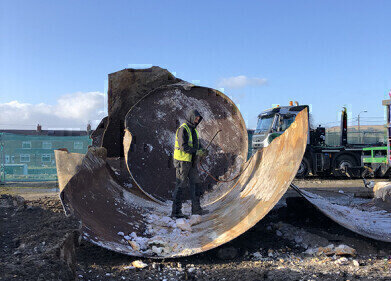-
 This is the second remediation attempt by ExxonMobil
This is the second remediation attempt by ExxonMobil
Soil Remediation
ExxonMobil undertake second remediation attempt
May 20 2014
Soil remediation is due to take place at a site near James River, Virginia, US, to clean up contamination caused by a fertiliser plant that formerly operated in the area. Around 500 cubic yards of soil within a quarter-of-a-mile site will undergo remediation work.
ExxonMobil have hired the firm Arcadis to remove the contaminated soil and replace it with clean earth as part of its efforts to clean up the site. This is the second attempt by ExxonMobil to address soil contamination at the former fertiliser plant. The soil at the site contains a number of pollutants, including lead and arsenic.
The site was used by the Virginia Carolina Chemical Company (VCC) from 1903 to 1924. VCC then merged with what would become Mobil Oil Corporation in 1963, with the site being sold in 1968. It is now owned by a private party, but the clean-up efforts are the responsibility of ExxonMobil.
Matt Gallagher, communications consultant at ExxonMobil, told News Advance that, although ExxonMobil as a company has not operated or owned the site directly, it is the corporate successor to the plant's original owner, which means it is responsible for the contaminants left on the site. The ExxonMobil Environmental Services group was created in 2008 to address the remediation needed on the site.
Previous work on the site was undertaken during 2012 by ExxonMobil, including the installation of a soil exposure barrier, removal of polluted earth and the installation of a demarcation liner. The exposure barrier and demarcation liner work together to block soils that have lead and arsenic concentrations that are above the levels suitable for remediation.
The remediation project is set to begin at some time next month (June), as long as approval is obtained from the county and the current property owners allow ExxonMobil to access the site. Any soil that is removed from the area will be taken to Amelia County to be disposed of. According to Mr Gallagher, the works should take around two weeks and will not have any impact on James River.
Events
May 05 2024 Seville, Spain
May 13 2024 Munich, Germany
May 23 2024 Beijing, China
May 23 2024 Beijing, China
Jun 10 2024 Algiers, Algeria












